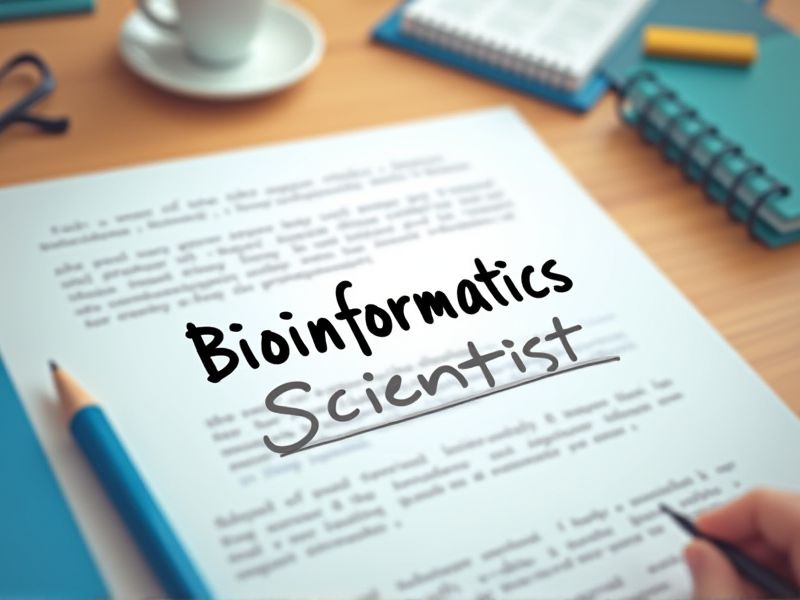
Bioinformatics scientists work at the intersection of biology and information technology, requiring a strong foundation in both fields. Certifications validate their expertise in niche areas, ensuring they possess the latest tools and methodologies for data analysis. Employers often prioritize certified professionals to ensure competency and credibility in handling complex biological data. Some noteworthy certifications to consider for a career as a bioinformatics scientist include the following.
Certified Bioinformatics Professional (CBP)
The rapid growth of biological data necessitates expertise in data analysis and interpretation, highlighting the importance of a Certified Bioinformatics Professional (CBP). Certification ensures that a Bioinformatics Scientist possesses up-to-date knowledge of computational tools and biological concepts critical for accurate research. Employers often seek certified professionals to minimize training costs and ensure a standardized skill set within their teams. Increased public funding in genomics and precision medicine programs drives the demand for certified individuals who can effectively contribute to cutting-edge projects.
Advanced Certificate in Bioinformatics and Computational Biology
The Advanced Certificate in Bioinformatics and Computational Biology provides specialized training that bridges the gap between biological sciences and computational tools, essential for addressing complex biological questions. Bioinformatics scientists require an in-depth understanding of both domains to efficiently process and analyze large-scale biological data, which this certificate focuses on. Rapid advancements in technology generate vast amounts of data, necessitating advanced skills in data analysis and computational methods offered through such programs. Earning this certificate enhances a bioinformatics scientist's ability to innovate and apply data-driven solutions in genomics, proteomics, and other bioinformatics fields.
Certificate in Genomic Data Science
With the increasing complexity of genomic datasets, a Certificate in Genomic Data Science equips bioinformatics scientists with advanced skills in data analysis and interpretation. Mastery of genomic tools and techniques allows scientists to identify and analyze genetic variations more efficiently. Proficiency gained through such certification enhances the ability to contribute to personalized medicine and targeted therapies. Demand for skilled professionals in this field continues to rise, making qualifications like this certificate essential for career advancement and impact.
Certificate in Next Generation Sequencing (NGS) Analysis
Bioinformatics scientists require a Certificate in NGS Analysis to efficiently handle the vast data generated by next-generation sequencing technologies. As NGS becomes increasingly integral to genetic research, possessing specialized skills ensures accurate data interpretation and analysis. The certificate equips scientists with the necessary competencies to innovate in areas like personalized medicine and novel drug discovery. Without these skills, scientists may struggle to keep pace with evolving methodologies and technologies in genomics research.
Certified Clinical Bioinformatics Professional
Bioinformatics scientists require the expertise of Certified Clinical Bioinformatics Professionals to ensure data analysis aligns with clinical standards. This certification enhances the ability to tackle complex genetic data with accuracy, leading to more reliable patient outcomes. With advancements in personalized medicine, there's a critical demand for professionals who can bridge the gap between computational tools and clinical application. As data complexity grows, the certification provides assurance of standardized skills in interpreting and managing bioinformatic data efficiently.
IBM Data Science Professional Certificate
The IBM Data Science Professional Certificate equips bioinformatics scientists with essential skills in data analysis, enhancing their ability to interpret complex biological data. Knowledge in machine learning from the course can lead to improved predictive modeling in genomic research. Familiarity with data visualization tools gained from the certification helps in effectively communicating research findings. Having a strong foundation in programming languages, such as Python, can streamline data processing and management tasks in bioinformatics projects.
R Programming Certification
Bioinformatics scientists rely on R programming for effective data analysis and visualization due to its specialized packages for genomic data. Mastering R enhances a scientist's capability to handle vast biological datasets efficiently, increasing research accuracy. Certification in R ensures standardized proficiency, essential for interdisciplinary collaboration and innovation. Organizations prioritize certified professionals, resulting in better job opportunities and career advancement in bioinformatics.
Python for Data Science Certification
Bioinformatics scientists increasingly require proficiency in data analysis, and Python is a dominant language in this area due to its extensive libraries like Biopython. A Python for Data Science certification equips professionals with the necessary skills to handle large datasets efficiently, which is critical in genomic research. With growing data complexity in bioinformatics, proficiency in Python aids in automating repetitive tasks, ensuring researchers can focus on analysis rather than data handling. Certification also provides validation of skills, enhancing career prospects in a competitive field.
Machine Learning Specialization Certificate
Machine learning specialization equips bioinformatics scientists with the tools to analyze large-scale biological datasets, enabling more accurate pattern recognition in genetic sequences. This skillset enhances the ability to develop predictive models for disease progression and personalized medicine. Understanding machine learning algorithms is crucial for integrating diverse biological data types, such as genomics and proteomics, to uncover complex biological mechanisms. A certificate signals proficiency, providing a competitive edge in the job market and increasing opportunities for interdisciplinary research collaboration.
AWS Certified Solutions Architect - Associate
Bioinformatics Scientists often work with large datasets that require scalable and efficient cloud computing solutions, making AWS skills crucial. The ability to architect solutions on AWS allows scientists to leverage powerful tools and resources for genomics research and data analysis. With the AWS Certified Solutions Architect - Associate, bioinformatics professionals can design secure, cost-effective, and high-performance cloud infrastructures tailored to their needs. Cloud-native skills enhance collaboration and sharing of computational models and data within research teams.
Summary
When you obtain certifications as a Bioinformatics Scientist, your career prospects often improve due to enhanced credibility and expertise. Employers tend to value certified professionals more, which can result in better job opportunities and potentially higher salaries. Your technical skills are likely to be more up-to-date, making you more effective in project execution. Having certifications may also increase your confidence and networking opportunities within the scientific community.
